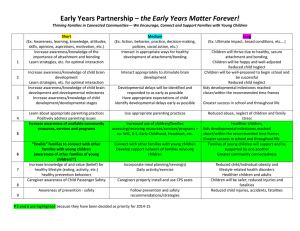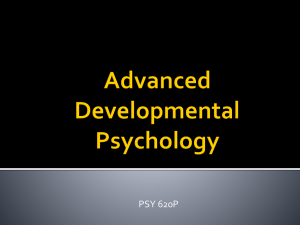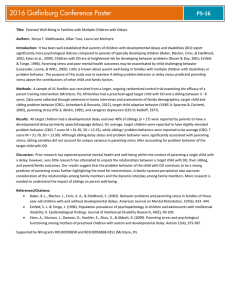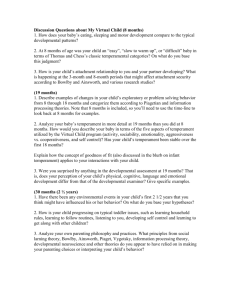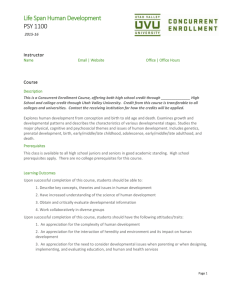Child-Development-and
advertisement
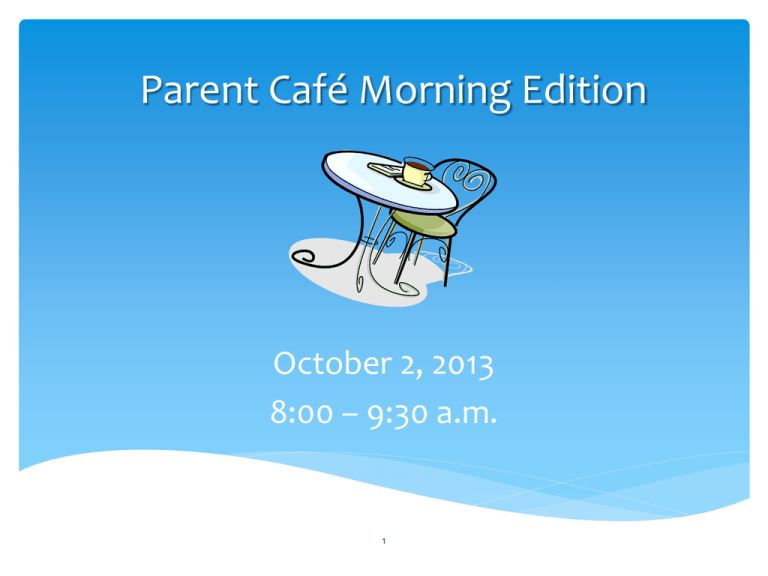
Parent Café Morning Edition October 2, 2013 8:00 – 9:30 a.m. 1 Welcome Goals for Today 1.Welcome and Introductions 2. Announcements 3. Ice Breaker 4. Presentation and Discussion 2 Child Development Marjola Roshi, MA, CAGS School Psychologist 3 Agenda • • • • • • • • Developmental Tasks Developmental Lag Indicators Suggested Behaviors for Effective Parenting Physical Development Characteristics-Guide Intellectual Development Characteristics-Guide Social Development Characteristics-Guide Emotional Development Characteristics-Guide Resource List 4 Developmental Tasks Educational Implications Piaget’s theory : The content of instruction needs to be consistent with the developmental level of the learner. § Provide concrete props and visual aids, such as models and/or time line § Use familiar examples to facilitate learning more complex ideas, such as story problems in math. § Allow opportunities to classify and group information with increasing complexity; use outlines and hierarchies to facilitate assimilating new information with previous knowledge. § Present problems that require logical analytic thinking; the use of tools such as "brain teasers" is encouraged. 5 Developmental Lag Indicators A child may present with a serious discrepancy within his or her developmental profile, yet such gaps may dissipate with time 6 Developmental Lag Indicators 7 Tips for Effective Parenting Seek to understand the CURRENT norm Academic and social expectations are different Self-reflect on your own possible bias Ask your child-Use curiosity rather than a guidance approach to get them to share Seek consultations with available resources such as school psychologist and guidance counselor when in doubt 8 Intellectual Development: Guide to Effective Parenting One’s abilities do not develop evenly Allow for the child to present his strengths Address the child’s weakness kindly and provide opportunities for them to enhance in these cognitive areas (e.g. use of blocks, puzzles etc…) Ignore: Temporary stuttering 9 Social Development Characteristics: Guide to Effective Parenting Balance: Be aware of the child’s social circle Guide them to learn principals of friendships, sharing and loosing. Acceptance: Child may identify well with adults outside the family 10 Emotional Development Guide to Effective Parenting One’s abilities do not develop evenly Be kind, but honest Use an objective approach to problem solving Restate the problem Provide a clear approach to a tangible solution Provide a timeline Seek to enhance their independence in specific tasks or presented issues gradually 11 Resources Resource List Green, Ross. (2005). The explosive child. A new approach for understanding and parenting easily frustrated, chronically inflexible children Child Development Guide (n.d.) Retrieved from http://www1.dshs.wa.gov/ca/fosterparents/training/chidev/ cd06.htm Garcia, W. Michelle. (2011). Socially Curious and Curiously Social. Social Thinking Curriculum 12 Questions? 13

